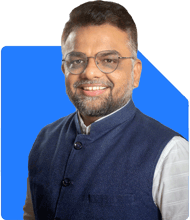Ramalingam Kalirajan |10873 Answers |Ask -Follow
Mutual Funds, Financial Planning Expert - Answered on May 22, 2024
He has an MBA in finance from the University of Madras and is a certified financial planner.
He is the director and chief financial planner at Holistic Investment, a Chennai-based firm that offers financial planning and wealth management advice.... more

Actually I'm of age 19,I don't have income ,but i get pocket money of 50rs daily,i have invested a lumpsum of 5k in quant small cap and 5k in quant flexi cap,1k in nippon multi cap and sip of 500 in nippon small cap and sip of 100 in nippon multi cap.Is this a good investment.
Evaluating Your Current Investments
Small Cap Funds
High Growth Potential
Small cap funds have high growth potential but also come with higher risk. They invest in smaller companies which can grow rapidly.
Risk Considerations
Small cap funds are volatile. Their performance can be affected by market fluctuations more than large or mid-cap funds.
Flexi Cap Funds
Flexibility in Investments
Flexi cap funds can invest across different market capitalizations, providing flexibility to adapt to market conditions.
Balanced Risk
These funds balance the risk by diversifying investments across large, mid, and small cap companies.
Multi Cap Funds
Diversified Portfolio
Multi cap funds invest in a mix of large, mid, and small cap stocks, offering diversification and reduced risk compared to pure small cap funds.
Growth Opportunities
They provide growth opportunities by capturing the potential of companies across different sizes and sectors.
Your Investment Strategy
Lumpsum Investments
Quant Small Cap and Flexi Cap
Investing ?5,000 each in Quant Small Cap and Quant Flexi Cap is a good start. These funds offer growth potential and diversification.
Systematic Investment Plan (SIP)
Nippon Multi Cap and Small Cap
Your SIPs of ?500 in Nippon Small Cap and ?100 in Nippon Multi Cap show discipline. SIPs help in averaging out market volatility over time.
Diversification
Importance of Diversification
Diversification reduces risk. By investing in different types of funds, you spread your risk and increase potential returns.
Current Diversification
You are already investing in small cap, flexi cap, and multi cap funds, which is good for diversification.
Suggestions for Improvement
Increase SIP Amounts Gradually
Reinvest Pocket Money
As you grow older and start earning, increase your SIP amounts gradually. This will compound your wealth over time.
Review and Rebalance
Regular Review
Review your portfolio every 6-12 months. Rebalance if necessary to align with your financial goals and market conditions.
Understand Fund Performance
Research and Monitor
Keep track of the performance of your funds. Understand the market trends and fund manager strategies.
Avoid Over-Concentration
Diversify Further
Avoid over-concentration in one type of fund. Consider adding other categories like balanced funds or debt funds for stability.
Education and Knowledge
Financial Literacy
Importance of Learning
Continue learning about different investment options and financial planning. Knowledge is power in making informed investment decisions.
Resources
Books and Online Courses
Read books and take online courses on personal finance and investing. This will help you understand complex concepts better.
Long-Term Planning
Setting Financial Goals
Short-Term Goals
Set short-term goals like building an emergency fund or saving for a specific purchase.
Long-Term Goals
Think about long-term goals like higher education, buying a house, or retirement planning.
Consistency and Patience
Stay Invested
Investing is a long-term game. Stay consistent and patient with your investments to see substantial growth over time.
Risks and Mitigation
Market Volatility
Understanding Volatility
Be prepared for market ups and downs. Do not panic during market corrections.
Risk Management
Balanced Approach
Balance high-risk investments with safer options. This approach helps in managing risk while aiming for growth.
Professional Advice
Certified Financial Planner
Consider consulting a Certified Financial Planner (CFP) for professional advice tailored to your financial situation and goals.
Conclusion
Your proactive approach to investing at 19 is commendable. By diversifying your investments and staying informed, you are setting a strong foundation for your financial future. Continue learning, stay disciplined, and seek professional advice when needed.
Final Thoughts
Your current investment strategy is a good start. With continuous learning and disciplined investing, you can achieve your financial goals.
Best Regards,
K. Ramalingam, MBA, CFP
Chief Financial Planner
www.holisticinvestment.in
You may like to see similar questions and answers below
Vivek Shah | Answer |Ask -Follow
Financial Planner - Answered on Apr 19, 2024
Ramalingam Kalirajan |10873 Answers |Ask -Follow
Mutual Funds, Financial Planning Expert - Answered on May 29, 2024
Ramalingam Kalirajan |10873 Answers |Ask -Follow
Mutual Funds, Financial Planning Expert - Answered on Jul 11, 2024
Ramalingam Kalirajan |10873 Answers |Ask -Follow
Mutual Funds, Financial Planning Expert - Answered on Jul 17, 2024
Milind Vadjikar | Answer |Ask -Follow
Insurance, Stocks, MF, PF Expert - Answered on Nov 20, 2024
Samraat Jadhav |2499 Answers |Ask -Follow
Stock Market Expert - Answered on Dec 08, 2025
Ramalingam Kalirajan |10873 Answers |Ask -Follow
Mutual Funds, Financial Planning Expert - Answered on Dec 08, 2025
Radheshyam Zanwar |6737 Answers |Ask -Follow
MHT-CET, IIT-JEE, NEET-UG Expert - Answered on Dec 08, 2025
Nayagam P P |10852 Answers |Ask -Follow
Career Counsellor - Answered on Dec 07, 2025

Research Career Prospects: IISc, IITs, and Beyond: For research-oriented careers, the Integrated M.Sc Physics program at Amrita provides an exceptional foundation. Amrita's curriculum specifically aligns with GATE and UGC-NET examination syllabi, and the institution emphasizes early research engagement. The faculty at Amrita actively publish research in Scopus-indexed journals, with over 60 publications in international venues within the past five years, exposing you to active research environments.
To pursue research at premier institutions like IISc, you would typically follow the PhD pathway. IISc accepts M.Sc graduates through their Integrated PhD programs, and with your Amrita M.Sc, you're eligible to apply. You'll need to qualify the relevant entrance examinations, and your integrated program's emphasis on research fundamentals provides strong preparation. The final year of your Integrated M.Sc is intentionally structured to be nearly free of classroom commitments, enabling engagement with research projects at institutes like IISc, IITs, and National Labs. According to Amrita's data, over 80% of M.Sc Physics students secured internship offers from reputed institutions during academic year 2019-20, directly facilitating research career transitions.
Placement and Direct Employment Opportunities: Amrita University boasts a comprehensive placement ecosystem with strong corporate and government sector connections. According to NIRF placement data for the Amrita Integrated M.Sc program (5-year), the median salary in 2023-24 stood at ?7.2 LPA with approximately 57% placement rate. However, these figures reflect general placement trends; physics graduates often secure higher packages in specialized technical roles. Many graduates join software companies like Infosys (with early offers), Google, and PayPal, where their strong analytical and computational skills command competitive compensation packages ranging from ?8-15 LPA for entry-level positions.
The Department of Corporate and Industrial Relations at Amrita provides intensive three-semester life skills training covering linguistic competence, data interpretation, group discussions, and interview techniques. This structured placement support significantly enhances your employability in both government and private sectors.
Government Sector Opportunities: UPSC, BARC, DRDO, and ISRO: Your M.Sc Physics degree opens multiple avenues for prestigious government employment. UPSC Geophysicist examinations explicitly list M.Sc Physics or Applied Physics as qualifying degrees, enabling you to compete for Group A positions in the Geological Survey of India and Central Ground Water Board. The age limit for geophysicist positions is 32 years (with relaxation for reserved categories), and the exam comprises preliminary, main, and interview stages.
BARC (Bhabha Atomic Research Centre) actively recruits M.Sc Physics graduates as Scientific Officers and Research Fellows. Recruitment occurs through the BARC Online Test or GATE scores, with positions in nuclear science, radiation protection, and atomic research. BARC Summer Internship programs are available, offering ?5,000-?10,000 monthly stipends with opportunity for future scientist recruitment.
DRDO (Defense Research and Development Organization) recruits M.Sc Physics graduates through CEPTAM examinations or GATE scores for roles involving defense technology, weapon systems, and laser physics research. ISRO (Indian Space Research Organisation) regularly advertises scientist/engineer positions through competitive recruitment for candidates with strong physics backgrounds, offering opportunities in satellite technology and space science applications.
Other significant employers include the Indian Meteorological Department (IMD) recruiting as scientific officers, and NPCIL (Nuclear Power Corporation of India Limited), offering stable government service with competitive compensation packages exceeding ?8-12 LPA for scientists.
Alternate Career Pathways: UPSC, CDS, and AFCAT: UPSC Civil Services (IFS - Indian Forest Service): M.Sc Physics graduates qualify for UPSC Civil Services examinations, with the forest service offering opportunities for science-based administrative roles with potential to reach senior government positions.
CDS/AFCAT (Armed Forces): While AFCAT meteorology branches specifically require "B.Sc with Maths & Physics with 60% minimum marks," the technical branches (Aeronautical Engineering and Ground Duty Technical roles) require graduation/integrated postgraduation in Engineering/Technology. An M.Sc Physics integrates well with technical qualifications, though you would need engineering background for direct officer entry. However, you remain eligible for specialized technical interviews if applying through alternate defence channels.
UGC-NET Examination: This pathway leads to Assistant Professor positions in central universities and colleges across India. NET-qualified candidates receive scholarships of ?31,000/month for 2-year JRF positions with PhD pursuit, transitioning to Assistant Professor salaries of ?41,000/month in government institutions. This route provides long-term academic career security with research opportunities.
Private Sector Technical Roles
M.Sc Physics graduates are increasingly valued in data science, software engineering, and technical consulting. Companies actively recruit physics graduates for software development, where strong problem-solving and logical reasoning translate to competitive packages of ?10-20 LPA. Specialized domains including quantum computing development, financial modeling, and scientific computing offer premium compensation. Your minor in Scientific Computing makes you particularly attractive to technology companies requiring computational expertise.
International Opportunities and Higher Studies Abroad
An M.Sc from Amrita facilitates admission to PhD programs at international institutions. German universities offer tuition-free or low-fee MSc Physics programs (2 years) with scholarships like DAAD providing €850+ monthly stipends. US universities accept M.Sc graduates directly for PhD positions with full funding (tuition coverage + stipend). These pathways require GRE scores and strong Statement of Purpose articulating research interests. Research collaboration opportunities exist with Max Planck Institute (Germany) and CalTech Summer Research Program (USA), both welcoming Indian M.Sc students.
Essential Skills and Certifications to Develop Immediately: Programming Languages: Start learning Python immediately—it's universally used in research and industry. Dedicate 2-3 hours weekly to data analysis, scientific computing libraries (NumPy, SciPy, Pandas), and machine learning fundamentals. MATLAB is equally critical for physics applications, particularly numerical simulations and data visualization. Aim to complete MATLAB certification courses within your first year.
Research Tools: Learn Git/version control, LaTeX for scientific documentation, and data analysis frameworks. These skills are indispensable for publishing research papers and collaborating on projects.
Certifications Worth Pursuing: (1) MATLAB Certification (DIYguru or MathWorks official courses) (2) Python for Data Science (complete certificate programs from platforms like Coursera) (3) Machine Learning Fundamentals (for expanding technical versatility) & (4) Scientific Communication and Technical Writing (develop through departmental workshops)
Strategic Internship Planning: Leverage Amrita's research connections systematically. In your third year, apply to BARC Summer Internship, IISER Internships, TIFR Summer Fellowships, and IIT Internship programs (like IIT Kanpur SURGE). These expose you to frontier research while establishing connections for future PhD or scientist recruitment. Target 2-3 research internships across different specializations to develop versatility.
TO SUM UP, Your Integrated M.Sc Physics degree from Amrita positions you exceptionally well for competitive research careers at IISc/IITs, prestigious government scientist roles at BARC/DRDO/ISRO, and international PhD opportunities. The program's scientific computing emphasis differentiates you in the job market. Immediate priorities: (1) Master Python and MATLAB within the first two years; (2) Engage in research projects starting year 2-3; (3) Target internships at premiere research institutions; (4) Prepare GATE while completing your degree for maximum flexibility in recruitment; (5) Consider UGC-NET for long-term academic stability. Your career trajectory will ultimately depend on developing strong research fundamentals, demonstrating consistent excellence in specialization areas, and strategically selecting internship and research opportunities. The rigorous Amrita program combined with disciplined skill development positions you for exceptional career success across multiple sectors. Choose the most suitable option for you out of the various options available mentioned above. All the BEST for Your Prosperous Future!
Follow RediffGURUS to Know More on 'Careers | Money | Health | Relationships'.
Nayagam P P |10852 Answers |Ask -Follow
Career Counsellor - Answered on Dec 07, 2025
Radheshyam Zanwar |6737 Answers |Ask -Follow
MHT-CET, IIT-JEE, NEET-UG Expert - Answered on Dec 06, 2025

Good luck.
Follow me if you receive this reply.
Radheshyam
Dr Nagarajan J S K |2576 Answers |Ask -Follow
NEET, Medical, Pharmacy Careers - Answered on Dec 06, 2025
Mihir Tanna |1090 Answers |Ask -Follow
Tax Expert - Answered on Dec 06, 2025
Ramalingam Kalirajan |10873 Answers |Ask -Follow
Mutual Funds, Financial Planning Expert - Answered on Dec 06, 2025
Radheshyam Zanwar |6737 Answers |Ask -Follow
MHT-CET, IIT-JEE, NEET-UG Expert - Answered on Dec 06, 2025




























